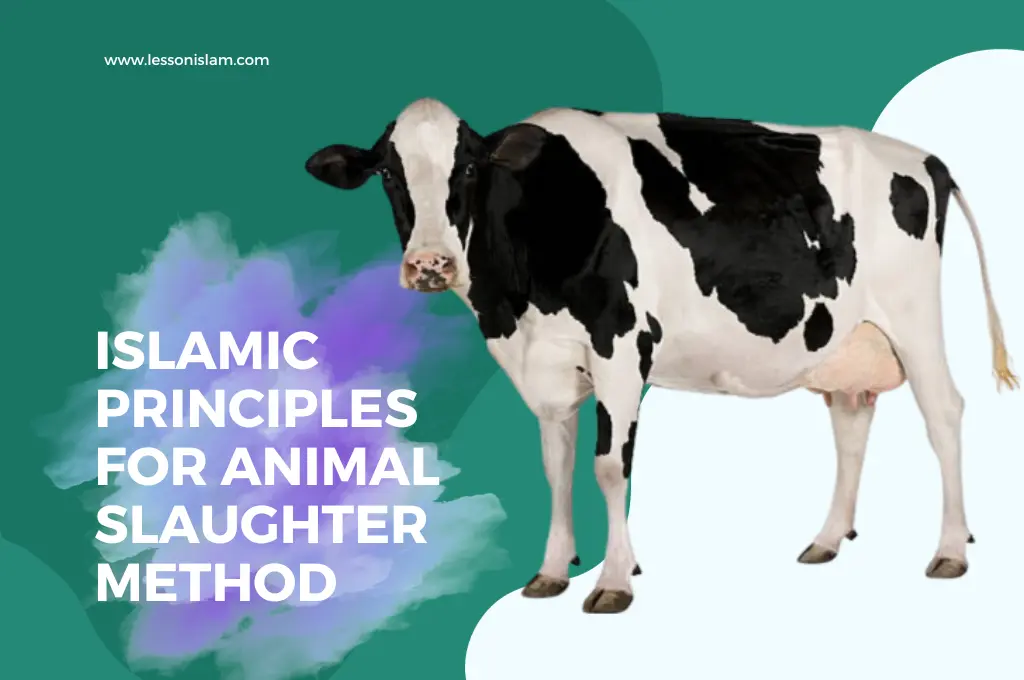As-salaam alaikum, friends, I hope you are doing well. We are here with the most important guidance, which is Islamic Principles for Animal Slaughter.
There are many misconceptions regarding the Islamic Slaughter method, so we brought this guide to understand the right process and what the hadith and Holy Quran verses say about Animal slaughtering.
Islam is the only religion that tells us all the aspects of life. It includes all the basic needs of human life.
Where the vast majority of the people eat the animal without following any slaughtering process.
Islam tells us how to Slaughter animals with the Islamic Method so it will be halal and beneficial for our health.
Also, we can follow the sunnah of the (prophet) Ibrahim.
Let’s dive into this topic.
What is Animal Slaughter?
In Islam, there are rules and guidelines provided by Islamic law regarding the slaughtering of animals for consumption. These rules aim to minimize an animal’s pain and suffering.
The major requirements for halal Islamic slaughter include:
- Using a sharp knife to ensure a quick kill and that the animal dies as quickly as possible. Drawing out the slaughter is prohibited. The knife must not kill due to its weight but instead should allow blood to drain from the animal’s body.
- All blood must be drained from the body. Consuming blood is forbidden in Islam.
- Invoking the name of Allah by reciting a prayer or blessing at the time of slaughter. This invokes the ideals of compassion and mercy during the act.
- The slaughter itself should not take place in front of other live animals as it may distress them.
Islamic Principles for Animal Slaughter.
There are many Islamic principles that we need to keep in mind while slaughtering animals.
These rules and recommendations are intended to minimize the pain and distress experienced by the animal during slaughter.
- Facing the Qibla (Qibla Rukh): The First and main important principle is the animal should be facing the qibla rukh (the Direction of the Ka’ba Mecca) at the time of slaughtering animal.
- Recitation of the Allah SWT Name: Bismillah (“In the name Allah”) while slaughtering an animal must be invoked before slaughter. Which means this dedication of the slaughter to Allah.
- Sharp Knife: while slaughtering the animal, using a sharp knife is obligatory. The Knife should be sharpened, and the throat should be cut on the first try. A sharp knife reduces pain and distress.
- Cutting Throat: The throat must be cut with a non-serrated blade, severing the carotid artery, trachea, and jugular veins.
- Drain all the blood: All blood of the animal must be drained from the carcass because consumption of the blood is prohibited in Islam.
Those animals which are within one’s capacity to slaughter, whether domesticated or wild, it is necessary that its blood is shed by a tool that has a cutting edge, and that it kills the animal with its sharpness and not by its force. This sharp thing may be a knife or anything else. However, it is disliked (makruh) to use a tooth or a claw in the Hanafi School and impermissible to do so in the Shafi’i school.
(Ibn Abidin, Radd al-Muhtar, 5/208)
Significance of Proper Slaughter Method
- Health and Hygiene: As we told you earlier, the blood of animals must be drained to avoid contaminated meat and the spread of disease. This also relates to the general Islamic emphasis on hygiene.
- Obedience to Allah SWT: Properly following religious guidelines around slaughter, such as the invocation of God’s name, facing the Qibla, etc., indicates obedience and submission to divine law.
Proper Handling of Meat Post-Slaughter
- Dedication of Allah’s name: Reciting Allah’s name before starting the preparations for the meat honoring the life taken. Indicates obedience and submission to divine law. This has spiritual significance for Muslims.
- Remove the Impurities: There are many impure contaminants in the animal body; after the slaughter process, we should check all impure contaminants have been removed. Especially must be drained.
- Cover up meat: In the Islamic tradition, Muslim scholars recommend that meat should be covered during transport and when it goes for sale in the market.
- Contamination: while washing the meat, do not use dirty water and other contaminating products, as it causes the risk of disease. Also, Islam does not allow such types of practices.
- Keep in Refrigerator: Due to the hot climate, there are recommendations in Islam for promptly cooling or refrigerating meat not consumed immediately to avoid spoilage and uphold hygiene and health
Benefits of Following Islamic Slaughter Principles
There are lots of benefits of the Islamic slaughter process, including:
Moral Benefits
- It shows mercy and minimizes the suffering of the animals. So that animals can get relief from the pain.
- Reciting Allah’s name before starting the preparations, the meat honoring the life taken. Indicates obedience and submission to divine law. This has spiritual significance for Muslims.
Health Benefits
- Draining blood thoroughly removes toxins and bacteria that could contaminate the meat if left unchecked. This prevents the potential spread of infections or food poisoning.
- Swift slaughter with a sharp knife lessens the build-up of waste matter like adrenaline or toxins released when an animal experiences prolonged distress.
Community Benefits
- Shared understanding and practice strengthen cultural identity and community cohesion for Muslim minorities living abroad.
- Guidelines for handling meat can facilitate trade exchange as they act as consumer protection from potential contamination.
Conclusion
I hope you found this article helpful; it is obligatory for all Muslims to take care of all the major Islamic Principles for Animal Slaughter.
Two are the things which I remember Allah’s Messenger (ﷺ) having said: Verily Allah has enjoined goodness to everything; so when you kill, kill in a good way and when you slaughter, slaughter in a good way. So every one of you should sharpen his knife, and let the slaughtered animal die comfortably.
Sahih Muslim 1955a
























Post Comment